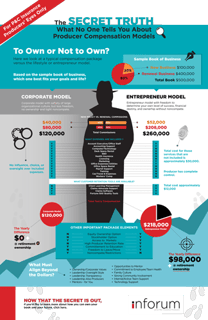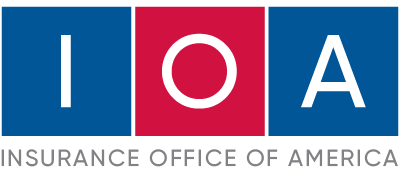Many property & casualty insurance industry producers have a similar compensation package from their employers--the corporate model. This may leave top producers feeling trapped in a position with minimal freedom, no ownership opportunities, and tight noncompete clauses. In contrast, another model exists with differing concepts and perspectives called the lifestyle or entrepreneurial model. Although no two corporate or entrepreneurial models are exactly alike, there are assumptions and generalities we can make for each type. For example, the corporate model may offer the perceived safety of a large organizational culture, while the entrepreneurial model provides the freedom to determine your own level of success and financial ownership without a noncompete.
Although no two corporate or entrepreneurial models are exactly alike, there are assumptions and generalities we can make for each type. For example, the corporate model may offer the perceived safety of a large organizational culture, while the entrepreneurial model provides the freedom to determine your own level of success and financial ownership without a noncompete.
To compare the two models, we'll use a sample book of business valued at $500,000, which is comprised of $100,000 (20%) in new business and $400,000 (80%) in renewals. Typically, the corporate model offers a 40% commission on new business and 20% commission on renewals, which leaves a producer with $120,000 annual commissions. In comparison, producers in an entrepreneurial model can receive an average of 52% commission on new business and 52% on renewals, which provides the producer with a $260,000 annual compensation.
Although the overall compensation from the corporate model is much less than that of the entrepreneurial model, the corporate model covers some expenses that the other does not including E&O, training, travel, and workers’ compensation. The entrepreneurial model, on the other hand, in the best models covers many expenses including office staff, accounting and tech support, marketing, and office expenses and utilities. The cost of the expenses that are not included varies, but they can range from $30,000-$42,000, depending on what the producer chooses. One important factor is that, in the entrepreneurial model, the producer has complete control of how much money is spent, where it is spent, and what services are used.
Looking strictly at a salary comparison allows you to see that, on average, the entrepreneurial model offers a higher compensation of $218,000 after expenses with a $500,000 book of business, whereas the corporate model offers $120,000 for the same book of business. With a difference of $98,000 per year, changing to a new model bears looking into. Moreover, the entrepreneurial model offers producers equity ownership, stockholder options, high retention rates, the freedom to leave or move, and freedom from restrictive noncompetes as compared to the corporate model, which traditionally does not offer these benefits.
Money isn’t everything, though. Considerations like ownership/corporate values, family culture, leadership transparency, access to world-class tools, and more also are important factors when making the decision between models. Be sure to consider what values are important in your life, compare them to your organization’s, and then make your decision on what model best suits you.
For a visual breakdown of the corporate and entrepreneurial models and for more information on the topic, download our infographic “The Secret Truth: What No One Tells You About Producer Compensation Models.”

